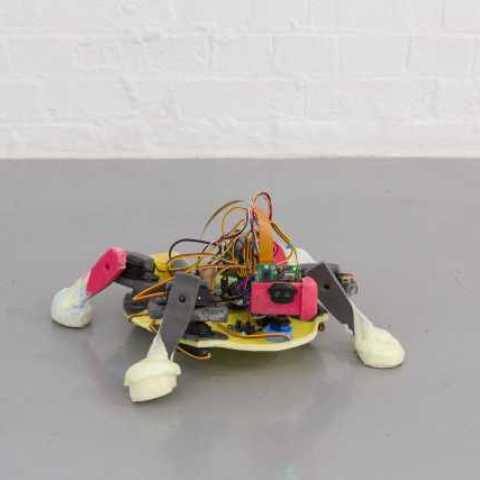Cross Lane Projects
Cross Lane
Kendal
LA9 5LB
United Kingdom

Cross Lane Projects, Kendal, is excited to announce it will reopen this Spring with an exhibition by Dean Kenning, winner of the Mark Tanner Sculpture Award 2020/21.
Dean Kenning (b.1972 Hounslow, UK) makes kinetic and sound sculptures, as well as videos and diagrams. His work is engaged with political, philosophical and scientific questions, and is produced through hands-on material and process-based experimentation, and in the spirit of DIY problem solving.
This free exhibition has been developed over the past year by the London-based artist, the 18th recipient of the prestigious award. Kenning has used this time to extend the possibilities for his kinetic sculptural practice to instigate affective, pathetic, and uncanny encounters whilst speaking to a vital ‘life force’.
For ’Evolutionary Love’ in Kendal, Kenning has produced a series of semi-autonomous, interactive creatures, which crawl and drag themselves continuously around the gallery, avoiding obstacles and interacting with visitors and each other. This new work is more technically sophisticated than Kenning’s previous kinetic artworks, but the effect is more ‘animalistic’ than ‘robotic’ as the focus remains on the aesthetics of movement, particularly nervous or compulsive movement.
“My ambition is to induce pathos and alertness in the viewer, as the mechanical behaviours of the moving sculptures suggest creaturely states, such as fear, curiosity and physical struggle towards a goal.”
The ‘crawlers’ are shown alongside kinetic ‘plant’ sculptures (or ‘psychobotanicals’). Flaccid, silicone arms, or branches, gyrate spasmodically, dance or battle each other on top of Styrofoam plinths. They are the flora to the crawling fauna, inhabiting the milieu of the gallery space.
The kinetic sculptures are accompanied by colourful diagrams: prints, paintings, and a large chalk drawing. They are thinking tools, which set out to explore natural, philosophical and artistic objects – the way they operate, grow and acquire meaning – by drawing analogies and by describing the various ways in which the elements which make them up connect.
The crawling works have evolved in close collaboration with creative computing educator and coder Llewelyn Fernandes and maintain a determinedly analogue aspect as new forms, functions and materials are developed in a continuous feedback process of trial and error production. In line with Kenning’s previous work, the necessity of getting kinetic sculptures to ‘work’ (and work consistently) forces and enables the artist to subordinate formal-compositional judgement, relinquish absolute authorial control and open the work up to contingency.
The MTSA is one of the most significant awards for emerging UK artists working in the field of sculpture. It seeks to reward outstanding and innovative practice, with a particular interest in work that demonstrates a commitment to process, or sensitivity to material. Kenning was selected from 220 applicants from across the UK by a panel comprising: Anne Hardy, artist; Sam Thorne, Director, Nottingham Contemporary; Rebecca Scott, artist and Mark Tanner Trust; and Olivia Bax, winner of the MTSA 2019-20.
About the artist
Dean Kenning (b.1972 Hounslow, UK) lives and works in London. Kenning completed a PhD ‘The Political Nature of Art Today’ at the London Consortium, University of London (awarded 2008); MA in European Literature, Culture and Thought at QMC, University of London (1999–2001); and BA in Fine Art at Goldsmiths College (1994–1997). He is Research Fellow at Kingston School of Art and a visiting lecturer in Fine Art at CSM.
‘Evolutionary Love’ takes its title from an 1893 essay by the pragmatist philosopher and logician C.S. Peirce, whose ‘synechistic’ system regards everything in the universe as continuous. Synechism denies binary distinctions such as mind–matter, self–other, and life–non-life, and understands differences as a matter of degrees of complexity. Evolution itself occurs at a first level by fortuitous variation, at a second, by mechanical necessity, and at a third, by creative love.
